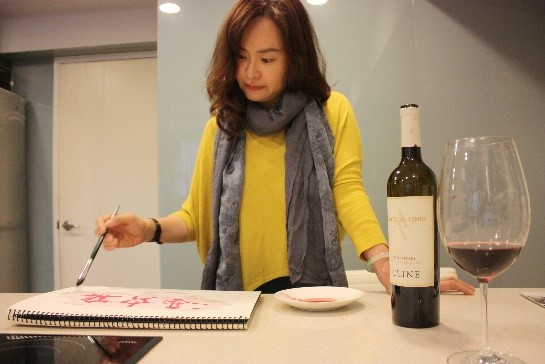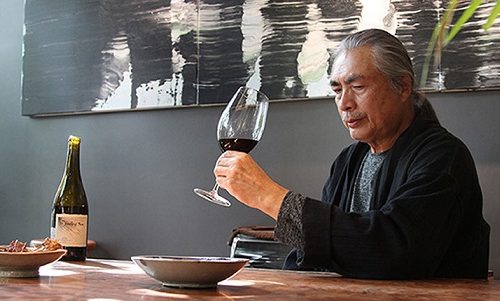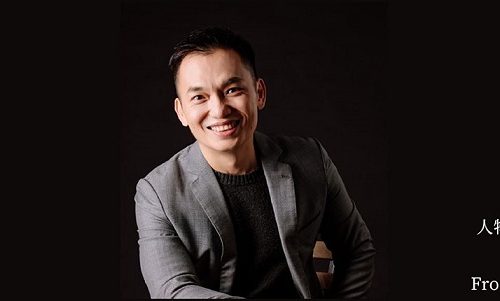人物專訪:黃愛倫-融合音樂與書法的藝術家Interview with Ellen Huang, Pianist & Calligrapher
(English Article Follows)
文/張家嫻 攝影/酒文集 圖/黃愛倫
初見到黃愛倫時,鵝黃色上衣,簡約大方藍色長褲,搭配素雅的圍巾,優雅大方的氣質,以及臉上的笑容令人感受到溫暖自在。黃愛倫自謙是「藝術世界的尋道者」,但她的鋼琴演出經歷包括:台北國家音樂廳、法國巴黎、沙木尼、 楓丹白露、庫胥薇爾、 紐約、德州、加州、洛杉磯、上海等地,並和知名鋼琴家夫婿諸大明錄製了「盧炎鋼琴四手聯彈作品第一號及第二號」、曾參與電影「玉卿嫂」、「望海的母親」配樂製作,並在中廣「音樂中的文學故事」節目主持。在書法上,也表現亮眼,獲得台北市總統府丁酉新春開筆大賽金獎,並曾在山東、江蘇、江西、廣東、台北等地舉行展覽。
以一個台大外文系畢業的高材生,為什麼會走上藝術之路?黃愛倫說,小時候父母忙於工作,成長過程較為孤獨,媽媽覺得藝術、電影與書本是一個人最好的朋友,而當時家就住在藤田梓老師與鄧昌國老師共同成立的「東方藝術學苑」對面,所以自然地開啟鋼琴學習之路,同時也與畫家張杰老師學習水彩、劉玉芝老師學習芭蕾以及民族舞蹈。這一切都處在一種「無所為而為」的狀況下自然學習,媽媽只單純覺得,小朋友不要一直看電視,有良好的成長環境就好。可能因為沒有壓力,反倒產生了濃厚的興趣,加上求學階段課業繁重,彈鋼琴成了一種紓壓出口,考試越多,越喜歡彈琴,不知不覺間,鋼琴成了生活重心、成了伴侶,更成了信仰。黃愛倫笑笑地說。
「凡事只要有熱情,再辛苦困難都能克服!」
黃愛倫畢業於外國語文學系,副修法文。由於外文系每學期都有戲劇公演,身為台大合唱團鋼琴伴奏的她往往被委託幕後配樂的重任,也開啟了她重新思索音樂表現的其他可能。畢業後,黃愛倫進入張弘毅老師的豐采音樂公司,擔任電影配樂助理,累積了一些實務經驗後,便負笈巴黎師範音樂院,主修鋼琴演奏,旁聽電影配樂,而後在美國紐約大學取得音樂教育碩士學位。
黃愛倫回憶起,剛到美國的時候,沒有床,沒有家具,住的地方什麼都沒有,空蕩蕩的房間裡只有一台鋼琴,晚上睡覺時躺在鋼琴下看著鋼琴,覺得快樂又幸福。年輕時總是滿腔熱血和衝勁,因喜愛音樂,熱衷看表演,尤其是大都會歌劇院、林肯中心,隨時都有不可抗拒的神級音樂會,但歌劇票一張要價100多美金,對學生來說負擔沉重。窮則變、變則通,情商同學幫忙買專給指揮系學生的四樓優惠票,只要六塊美金,座位上有一個附燈的小桌子,可以閱讀總譜,往下鳥瞰舞台只能看到小小的人,但音效以及演奏仍然很棒,聽到激動之處,甚至會落淚。就是因為太熱愛音樂了,最後乾脆直接應徵大都會歌劇院的帶位員,除了能賺取經濟所需,同時也能享受自己最愛的歌劇及演奏。黃愛倫回憶起過往眼睛一亮,臉上也露出不言而喻的滿足,曾經在異鄉的生活,再次回味依舊是無與倫比的精彩,由於對音樂的熱愛,一切甘之如飴。
六年前開始接觸書法,驚喜地發現中國最古老的書法藝術竟然與西方音樂有許多共通點。
「一直以來西方文化藝術佔據我生命中很重要的地位」,黃愛倫緩緩著說著,不諱言當今台灣的教育是相當西化的,加上鋼琴的學習及外文系的訓練,可以說幾十年來,對自己的文化反倒相形疏遠陌生,隨著年紀成熟後,隱隱有落葉歸根,尋找東方源頭的想法,而書法是純中國的,也是中國文化的核心。而這項藝術的基本功訓練著重於臨摹,屬於精英的小眾藝術。但國外所學所聞,以及文學、戲劇及美學上的專業系統訓練,讓黃愛倫想用其他的方式,讓書法與藝術結合,用另一種新面貌呈現,寫時代的語言。「摹寫是與古人的神交,能創作打破時間距離、空間藩籬、甚至跨領域的作品,才不辜負我們處在這個資訊唾手可得的美好年代。」黃愛倫說,往往在音樂、書法的學習中,因發現二者的共通性而喜不自勝。書法與音樂在線條質感、線條情感、韻律節奏等等有著太多可以分享之處了!

創意不受限在藝術的表現上,在生活的也處處展現出創意。
我的拿手菜,應該就是法式紅酒燉雞吧!黃愛倫面露可愛的表情說著,「旅居巴黎時住在修女經營的音樂宿舍裡,由於在歐洲,瓶裝水比紅酒還要昂貴,所以修女們給這群十幾二十歲的小女生餐餐的飲料是酒而不是水,也開發了我對酒及美食的興趣」。對黃愛倫來說,疲倦時小小療癒的方法,就是下廚做菜。喜歡嘗試新鮮事物的黃愛倫享受做菜的過程,用創意入菜每道菜都是實驗品,當然有時會有失敗的時候,而失敗的餐點就讓家人做試吃囉, 黃愛倫捂嘴笑著,但聊到了紅酒燉雞時,黃愛倫熟練分享製作方式,「Coq au Vin 這道菜是法國最經典的家常菜,材料很庶民,但是工序繁複,能以我喜愛的紅酒入菜是很大的享受,做它多遍還是次次有驚奇……….」藝術家求完美的精神,似乎在這道「法式紅酒燉雞」中徹底展現了。
黃愛倫提及自己的前半生一直奮力學習、嚴謹生活,歐、美的人生哲學讓她更加珍惜及享受當下精彩的每一刻,訪問中黃愛倫即興以「酒文集」三字,用紅酒和書法做藝術創作結合,她解釋:「酒」字是酒罈的意象、篆字「文」模擬一個微醺而手舞足蹈的人、篆字「集」則是三隻鳥棲息在樹上,意喻喝酒這美好的事是獨樂樂不如眾樂樂的。而後刷上2016年的紅酒Zinfandel ,頓時字體整個活了起來,現場大家都感受了紅酒帶來的歡樂與驚奇!

「酒」:酒罈意象
「文」:一個微醺而手舞足蹈的人
「集」:三隻鳥棲息在樹上,表示喝酒是獨樂樂不如眾樂樂的事
背景顏料:2016 Cline Ancient Vines Zinfandel
「跟隨大眾市場很重要,但也要保有自己的特色,不要隨波逐流。」
對於想從事藝術創作的青年們,黃愛倫認為現在的媒體傳播是一股很大的力量,因此適當的與媒體結合是很重要的一個環節, 但也因爲資訊傳播太過快捷,思想的同化也難以避免。在這同時,不要隨波逐流被大眾市場干擾而喪失自我,首先確認自己的定位及方向,建立風格與辨識度,勇於擁抱新的思潮, 不斷創新突破,並堅持自己方向前進。「凡事只要有熱情,再辛苦困難都能克服!」
At the Intersection of Music & Calligraphy
This is the first time I am meeting Ellen Huang. She is wearing an attractive mustard-colored sweater, paired with a patterned scarf, and comfortable blue slacks. Her appearance is stylish but understated and classic, and her smile is warm and inviting. Modestly, she states that her goal is not only to develop her art, but also find the principles and deeper meaning of any art in which she is involved.
Ellen’s first artistic love is the piano and she was formally trained at New York University (NYU) in New York City. She performed piano recitals at the National Concert Hall in Taipei; in France (Paris, Chamonix, Chateau de Fontainebleu); in the USA (New York, Dallas, Los Angeles), and Shanghai. Ellen appeared with her well-known husband, Concert Pianist Daming Zhu, on a recording of 4-hand piano pieces by the Taiwan composer, Lu Yen. Ellen participated in the musical scores of two Taiwan movies. She was also the host of a radio music program.
Her second artistic interest lies in Chinese Calligraphy, and her talent was confirmed, when she was awarded the Gold Medal in an ROC Presidential Calligraphy Competition in 2017. Her calligraphy has been exhibited in Shandung, Jiangsu, Jiangxi, Guangdung, and Taipei.
So the question is, “Why would Ellen Huang, a graduate of the Foreign Languages & Literature School at the National Taiwan University, devote herself to the field of the Arts?”
Ellen relates, “When I was growing-up, my parents were quite busy, so I was a bit lonely. My mother suggested that learning the arts and reading are good ways for a child to spend her time. In the neighborhood, there were two leading music teachers – pianist Madame Anna Fujita, and violinist conductor Chang-Guo Deng – whom started the Dung Fang Art School, where I studied piano. I also studied watercolor painting from Chang Jie, and ballet from Liu Yur-Zhi. Because I was never pressured to learn the arts, my enthusiasm was always high and I was a good student. Also, as everyone knows, Chinese secondary school requires intensive studies and testing, so playing the piano was a good way for me to relax and ease the academic pressures of Chinese school.”
As long as you are enthusiastic, you can overcome difficulties
Ellen not only graduated from the Foreign Languages School at Taiwan University in English, but also she minored in French. Periodically, there were performances of plays in her school. And she was usually the person who was in-charge of providing the musical scores for these plays. After she graduated from Taiwan University, Ellen joined the music studio of Chang Hung-I, and was an assistant for music scoring for film. After gaining adequate experience, she moved to Paris to further her piano studies at the Ecole Normale de Musique de Paris (Music Teachers’ School). Again her primary focus was specifically on creating musical scores for film. Following her studies in France, she was accepted to NYU in New York City, where she received her Master’s Degree in Music Education.
Ellen Huang remembers when she first arrived in the USA, she didn’t have a bed or any furniture – only a singular piano in her apartment. When it was time for sleep, she reclined under the piano, but she was quite happy and thankful. Ellen said, “When people are young, they have a lot of energy and passion!” Ellen has a love for music and theater, therefore she felt that New York City was the ideal place her to be at that time, with opportunities to attend the Metropolitan Opera, Lincoln Center, and all of the theaters on Broadway, to mention a few. Theater and concert tickets in New York City are generally quite expensive – usually not within the budget of university students. However, there were “cheap” seats afforded to music students, located high-up in the loges of the theaters (far away from the stages), which Ellen took advantage of. The positive aspect of these spaces was there were usually a small table and light, from which she could read the plays scripts. Although the stage and actors were quite small from such a distance, the music was still excellent and moved Ellen.
Because Ellen’s love for music, she applied for a job at the Metropolitan Opera as an usher. Not only did she earn a little money, but she could enjoy the daily performances. When Ellen reminisces about her experiences of that time, she has a wistful smile on her face.
Upon being introduced to calligraphy in 2013, Ellen was surprised to discover that Chinese calligraphy has many things in common with Western Music
Ellen confirms that Western music and culture has had a great impact on her life. However, she also states that the current Taiwan education also has many Western influences. She also admits that her educational background in Western Music and foreign languages made her a “stranger” to Chinese culture and arts. As she matured, Ellen desired to find her cultural “roots”. She states, “Calligraphy is the most basic cultural aspect of Chinese culture.” Training in calligraphy requires careful repetition, and an eye for what is considered to be the proper execution of a Chinese character. However, Ellen also integrates her Western education into her interpretation of calligraphy, to create a new form of calligraphy for all to experience.
Ellen explains, “While ancient calligraphy is artistic on its own merits, art cannot be static. I have employed my Western artistic influences in music and culture, to reinterpret Chinese calligraphy to make it more relevant and interesting to the present-day people. Although music is an aural experience, while calligraphy is a visual experience, their commonality is in their required rhythm and tempo.”
Creativity is not limited to Art, but is also prevalent in Daily Life
Ellen states, “I enjoy cooking – my favorite dish to cook is the French chicken marinated in wine (Coq au Vin).
When I was living in Paris, I stayed in a dormitory which was run by Catholic nuns. Meals were prepared for dorm residents. Wine is more expensive than bottled water in France, so at meals, wine was served as our beverage. From this experience, I began to enjoy tasting wine and different foods. When I am tired or stressed, I enjoy cooking – particularly the process of cooking – and I like to be creative and experiment with the food ingredients and preparation. Of course, there are times when my cooking experimentation is not that tasty or successful, however, members of my family are my “guinea pigs” and they are tasked with consuming my food creations.”
Upon discussing cooking, Ellen proceeds to enthusiastically explain the details of how to prepare Coq au Vin, which is a famous and popular dish in France. While the ingredients are simple, the key is in the preparation. Further, Ellen mentions that she enjoys cooking with wine. She said, “Every time I prepare Coq au vin, the results are a bit different. This is similar to Art in that it requires creativity each time.”
“The first part of my life in Taiwan was concerned mainly with diligently learning as much as I could – – a typical Taiwan student’s life. However, it was only after living in the West (Paris and New York), that I realized that people need to relax at times, and Life is to be enjoyed and cherished.” Ellen remarks.
At that moment, Ellen decides to demonstrate her creativity in calligraphy using red ink, writing the words “Jiou Wen Ji” (da Vinci – alliterative in Chinese). The “Jiou” is represented by a wine urn; “Wen” is represented by a slightly tipsy person, and “Ji” is represented by a gathering of birds nesting on a tree – the overall meaning is that wine is to be enjoyed with friends. Then she decides to dip her brush into a small dish of 2016 Cline Ancient Vines Zinfandel, and then uses it to brush over the red characters, which causes the characters to “pop” out of their background, giving a please 3D effect – and integration of calligraphy and wine.
While, as an artist, it is important to be aware of current trends and interests, it is equally important to keep your identity and style, and not “sell out” to what is popular.
Ellen advises to young people who are interested in pursuing Art as a career, “Social media is a double-edged sword. It is important to be able to use social media as a tool to quickly reach a large audience for commercial purposes, and to gain wide exposure. However, artists need to be careful not to be influenced by the art of others, as you need to retain your own artistic identity and style.”
Finally, Ellen emphasizes, “If you are passionate about Art (or any other topic), it is alright to experience difficulties and hardships, as long as you keep yours Goals in mind.”



